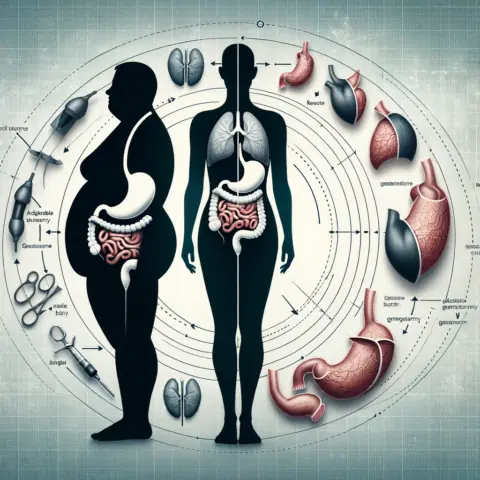Bariatric surgeries, a term that encompasses a range of procedures aimed at assisting individuals in achieving significant weight loss, have seen a surge in popularity and technological advancements over the years. At the heart of these procedures lies the science of satiety. But what exactly is satiety, and how do bariatric surgeries influence it? Let’s delve deep into the topic.
Understanding Satiety
Satiety is the feeling of fullness and satisfaction after eating. It’s the body’s mechanism to prevent overeating and ensure that we consume just the right amount of food. Several factors influence satiety, including the type of food consumed, its volume, and its nutrient content. However, for individuals struggling with obesity, the satiety mechanism might not function as effectively, leading to overconsumption and weight gain.
Bariatric Surgeries: A Brief Overview
Bariatric surgeries, such as the gastric bypass procedure, intragastric balloon procedure, and adjustable gastric banding, are designed to alter the digestive system’s anatomy. These alterations can reduce the amount of food the stomach can hold or change the way nutrients are absorbed. As a result, patients often experience early satiety and reduced appetite.
The Role of Hormones
One of the primary ways bariatric surgeries impact appetite is through hormonal changes. The gut produces several hormones that regulate appetite, hunger, and satiety. Surgeries like the gastric bypass can alter the production of these hormones, leading to decreased hunger and increased feelings of fullness.
For instance, after undergoing a bariatric procedure, there’s a notable reduction in the hunger hormone ghrelin. On the flip side, hormones that promote satiety, such as peptide YY and glucagon-like peptide-1, see an increase in their levels.
The Physical Aspect
Apart from hormonal changes, the physical modifications to the digestive system also play a crucial role in promoting satiety. Procedures like the laparoscopic adjustable gastric banding reduce the stomach’s size, ensuring that patients feel full after consuming smaller portions of food. This physical limitation, combined with the hormonal changes, ensures that patients consume fewer calories, leading to weight loss.
The Emotional Journey
Undergoing bariatric surgery is not just a physical transformation; it’s an emotional journey. Many patients report changes in their relationship with food post-surgery. The emotional journey after bariatric surgery can be complex, with patients navigating their feelings towards food, their self-image, and their new dietary restrictions. It’s essential to understand that while the surgery can be a tool for weight loss, the emotional and behavioral aspects play a crucial role in ensuring long-term success.
Technological Advancements in Bariatric Surgery
Bariatric surgery has come a long way, with technological advancements ensuring that the procedures are safer and more effective. From minimally invasive techniques to the use of robotics, the field of bariatric surgery is continually evolving, offering patients better outcomes and reduced recovery times.
The Multifaceted Impact of Bariatric Procedures
Bariatric surgeries, while primarily known for their weight loss benefits, have a profound impact on various aspects of a patient’s life. From the physiological changes that lead to improved metabolic health to the psychological transformation that many undergo, the effects of these surgeries extend far beyond the scale.
Metabolic Improvements
One of the most significant benefits of bariatric surgeries, such as the gastric bypass, is the improvement in metabolic health. Many patients see a remarkable reduction in comorbidities like type 2 diabetes, hypertension, and dyslipidemia. The surgeries can lead to changes in gut hormones, bile acids, and gut microbiota, which play a pivotal role in enhancing insulin sensitivity and overall metabolic function.
Nutritional Considerations
Post-surgery, patients need to adhere to specific dietary guidelines to ensure they get the necessary nutrients. The post-operative nutrition guide provides a comprehensive overview of the dietary changes required. From consuming protein-rich foods to taking vitamin and mineral supplements, patients need to be proactive in ensuring their nutritional needs are met.
The Importance of Exercise
Physical activity is a cornerstone of maintaining weight loss and overall health post-surgery. Engaging in regular exercise after bariatric surgery not only aids in weight maintenance but also improves cardiovascular health, muscle strength, and mental well-being. Whether it’s walking, swimming, or strength training, finding a physical activity that one enjoys is crucial.
Financing and Insurance Considerations
The decision to undergo bariatric surgery is not just a medical one; it’s also financial. Understanding insurance coverage for bariatric surgery and exploring options for financing your bariatric surgery are essential steps in the pre-surgery process. It’s vital to be well-informed about the costs involved and the support available.
The Role of Support and Community
Having a robust support system post-surgery can make a significant difference in a patient’s journey. From bariatric support groups to finding community after gastric bypass, being connected with individuals who understand the challenges and triumphs can be immensely beneficial.
Addressing Myths and Misconceptions
There are several myths about bariatric surgery that can deter individuals from considering it as a viable option. Whether it’s misconceptions about the surgery’s safety or its long-term effects, it’s essential to separate fact from fiction.
The Journey Ahead: Life After Bariatric Surgery
The life after bariatric surgery is a transformative one. From the initial stages of understanding the pre-surgery diet to the long-term lifestyle changes, patients embark on a journey of self-discovery, health, and wellness.
Navigating the Long-Term Landscape of Bariatric Surgery
The journey doesn’t end once the surgery is over. In fact, for many, it’s just the beginning. The long-term landscape of bariatric surgery is filled with opportunities, challenges, and transformative moments that shape a patient’s life in profound ways.
Long-Term Health Monitoring
After undergoing a procedure like the gastric bypass, it’s crucial for patients to engage in long-term health monitoring. Regular check-ups, blood tests, and consultations ensure that the patient remains in optimal health and any potential complications are addressed promptly.
Emotional and Psychological Well-being
The emotional journey after bariatric surgery is as significant as the physical one. Many patients experience a range of emotions, from elation at their weight loss success to challenges with body image. Seeking support, whether through therapy or support groups, can be instrumental in navigating these complex emotions.
The Role of Personalized Medicine
With advancements in the field, there’s a growing emphasis on personalized medicine and bariatric surgery. This approach tailors treatment plans to individual patients, considering their unique genetic makeup, lifestyle, and health needs.
Overcoming Challenges
While the journey is rewarding, it’s not without its challenges. From overcoming emotional eating to navigating relationship changes, patients need to be equipped with the right tools and mindset to address these hurdles.
Celebrating Success Beyond the Scale
Weight loss is often the primary focus, but it’s essential to measure success beyond the scales. Whether it’s improved mobility, better mental health, or enhanced quality of life, there are numerous ways to celebrate the transformative impact of bariatric surgery.
Conclusion
The science of satiety and the impact of bariatric surgeries on appetite is a multifaceted topic that delves deep into the physiological, emotional, and psychological aspects of a patient’s journey. At Peak Bariatric, we’re committed to supporting our patients every step of the way, ensuring they have the resources, knowledge, and community to thrive in their post-surgery life.
Science of Satiety Takeaways
Topic: The Science of Satiety: How Bariatric Surgeries Impact Appetite
- Bariatric Surgery and Appetite:
- Physically alters the stomach and intestines.
- Affects gut hormones.
- Leads to reduced hunger and increased feelings of fullness.
- Impact on Long-Term Health:
- Improvements in blood sugar levels, cholesterol, and blood pressure.
- Regular health monitoring is essential.
- Emotional Challenges Post-Surgery:
- Range of emotions from elation to challenges with body image.
- Importance of seeking support.
- Personalized Medicine in Bariatric Surgery:
- Tailors treatment to individual patients.
- Considers genetic makeup, lifestyle, and health needs.
- Measuring Success Post-Surgery:
- Focus on weight loss.
- Consider improved mobility, mental health, and quality of life.







